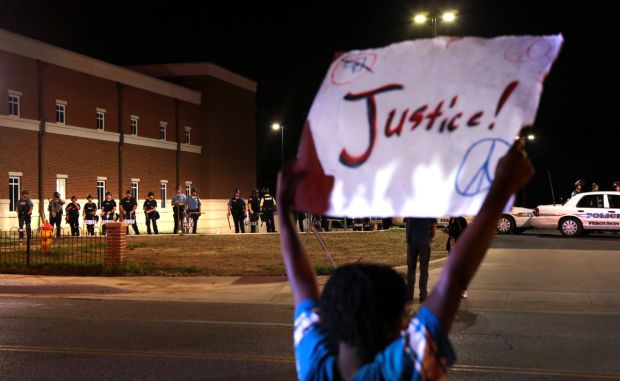
Yesterday, a few days after the US Department of Justice issued a report on the injustice in the Ferguson police department and court system, a judge at the center of the controversy was forced to resign. As the Huffington Post summarized it:

The judge who allegedly turned Ferguson’s municipal court into a city cash cow resigned Monday, and the Missouri Supreme Court ordered a new jurist to take over the city caseload.
The Supreme Court of Missouri said in a statement that it was assigning Judge Roy L. Richter to take over Ferguson Municipal Judge Ronald Brockmeyer’s court “to help restore public trust and confidence.”
This is a victory for a social movement that put the spotlight on the Ferguson justice system after the killing of Michael Brown. People who live in Ferguson knew that the killing of Brown was the tip of the iceberg of a racially charged justice system that was mistreating people from communities of color.
The New York Times reported some of the reaction:
Word of a turnover in the court quickly trickled through City Hall here, where about a dozen residents had been sitting in frustration as the City Council met behind closed doors to discuss issues related to the Justice Department report.
But their anger turned to mild cheers when word spread through the room that Mr. Brockmeyer had been replaced.
An area resident, Michael Moffitt, 35, cheered and gave those around him high-fives when he heard the news.
“It shows they might stop pulling people over just to meet a quota,” Mr. Moffitt said.
Marsha McGee, who lives in Florissant, criticized Mr. Brockmeyer as giving favorable treatment to people he knew, according to the Justice Department report. A new judge, she said, “might bring some fairness.”
The Huffington Post reported additional views of local residents who have been advocating for changes in the justice system:
Reform advocates who said Ferguson is one of many small municipalities in St. Louis County that routinely violate the rights of residents said the judicial moves are a good start.
“I hope that it marks the beginning of a long process,” said Brendan Roediger, a civil rights lawyer and St. Louis University Law Scool professor who is involved in a lawsuit against Ferguson and a neighboring municipality. Roediger said Brockmeyer “was never the worst municipal court judge” in the St. Louis region, where similar conflicts exist in many courtrooms.
The St. Louis Post-Dispatch reported:
A group of residents waiting outside a closed meeting of the Ferguson City Council on Monday night cheered the news.
“That’s big,” said Melissa Sanders, 32, of Ferguson. “I’m elated — for now.”
Sanders, of the activist group Lost Voices, said she was concerned that “they may be just pacifying us.”
The Missouri Supreme Court sees that new policies and rules may be needed for courts throughout Missouri and put the decision in a broader context:
Supreme Court Chief Justice Mary R. Russell said in a statement that replacing Ferguson’s judge was warranted as the court reviews the need for broader reforms in municipal courts, which she noted handle two-thirds of all state court cases.
“Though these are not courts of record, they are the first — and sometimes the only — impression Missourians have of their court system,” Russell said. “Although we recognize the local control our statutes give these uniquely local entities, we must not sacrifice individual rights and society’s collective commitment to justice.”
Brockmeyer not only funded Ferguson’s budget by fining its poorest residents and sending them to prison when they couldn’t pay a few hundred dollars, he also stands accused of fixing fines for his friends and for himself and according to the Guardian owes $170,000 in unpaid taxes.
Ferguson officials had been warned of the problems with Brookmeyer but ignored them because they did not want to lose any efficiency in the fines the city was receiving. The NY Times reports:
The judge, who was recommended by the city manager and approved by the City Council in 2003, certainly had his skeptics within City Hall. In 2012, a Council member wrote to other city officials opposing the reappointment of Mr. Brockmeyer, arguing that he “does not listen to the testimony, does not review the reports or the criminal history of defendants, and doesn’t let all the pertinent witnesses testify before rendering a verdict.”
In response to that letter, the city manager, John Shaw, acknowledged the judge’s shortcomings. But, according to the report, Mr. Shaw said, “the city cannot afford to lose any efficiency in our courts, nor experience any decrease in our fines and forfeitures.”
Last week, Ferguson Municipal Court Clerk Mary Ann Twitty was fired over racist emails also had a great deal of impact on the court system in Ferguson. In addition to Brockmeyer and Twitty, two police department officials resigned last week, including one who supervised Darren Wilson. This may not be the end of people fired or resigning. The St. Louis Post-Dispatch reported:
Asked after the council meeting whether City Administrator John Shaw and Police Chief Thomas Jackson might be ousted, Ferguson spokesman Jeff Small said: “Given the gravity of the (Justice Department) report, it’s safe to say everything is on the table.”
When she marched in Selma on the 50th anniversary of the march, Leslie McSpadden, Michael Brown’s mother, told Amy Goodman that not only should the police chief be fired but the police force in Ferguson disbanded.
Brockmeyer continues to serve as a judge and prosecutor in surrounding jurisdictions. If he is behaving inappropriately in Ferguson, I suspect the same is true in other areas. We hope that those jurisdictions will also reconsider their relationship with Brockmeyer or that he recognizes he is not fit for public office.

















